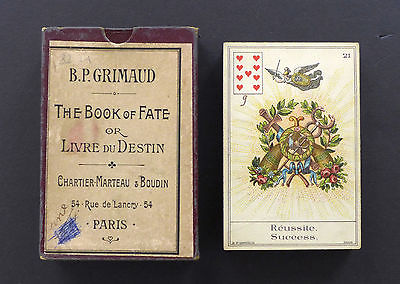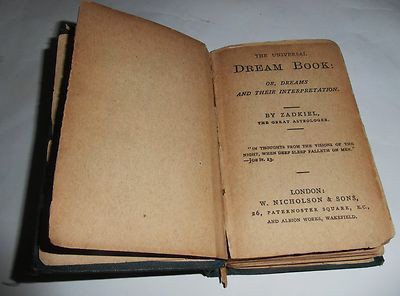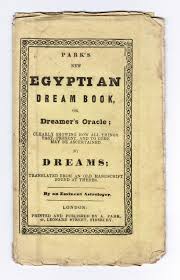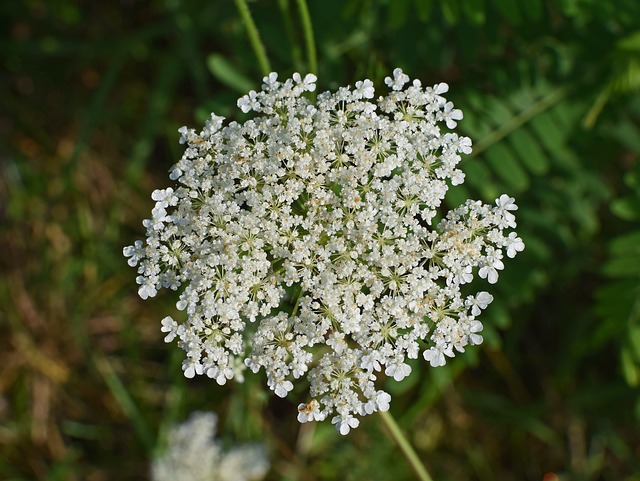On a recent visit to the Arcade, I was handed a rather interesting book. From the outside the book looked to be on its final legs with a tired leather cover and pages that were just as dusty. The book was called The Imperial- Royal Dream Book and although not dated, appeared to have been printed between 1830 and 1860. On the cover in shallow relief was noted that this was a Book of Fate with sub-headings noting that the book also dealt with fortune telling and dreams.
These days, one often find books on this subject which claim to determine the meaning of dreams and other such poppycock. This is not to dismiss the importance of dreams as I for one quite often write about them. But on the whole, a majority of dreams can be easily explained. I am scared of heights and falling and quite often I dream about being in a high building unable to move as I am frozen by fear. The explanation is simple, I am scared of heights and feel disorientated when I am high above the ground. I find that I feel nervous when walking along cliff top paths which, although set well away from the cliff edge, still cause me distress.
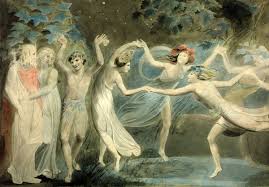
William Blake [Public domain], via Wikimedia Commons
If I read a modern book of dreams it would most probably note that I am unsure of myself and I lack confidence (neither of which is true). If anything, I am somewhat over confident and sometimes this leads me into trouble. But what would my dream book make of my fear of heights? Initially I thought it would say that I was in awe of my second cousin or I was attracted to guinea pigs or something just as remote from the truth. But no, my little book notes that if I dream about falling, it denotes the loss of place and goods which means little to me, but I suppose to a man or woman in the Victorian era it meant much more. There are many other entries in the dream section of this book and some are valuable indicators if one is studying the social history of the period.
Others with today’s heightened sensibilities (and yes I am writing this from my safe-space in my room at university) could quite easily be seen as sexist and racist or many of the other words which are so popular today. But as with all things, history is history and cannot be changed and what was acceptable in let’s say 1850 might not be acceptable to today’s snowflake generation. But I am not writing a history of social attitudes but about a smallish rather tired book which is currently sitting next to me on my desk. To give you a taste here are five of the more acceptable dream interpretations.
Melons- to dream of melons, to a sick person is a prognostic of recovery, by reason of their humidity or juicy substance.
Rowing– to dream that you are rowing in a boat signifies that you will be successful in love and business.
Birding – to dream you catch birds, signifies profit and pleasure
Tour- to dream that you are taking a tour of pleasure signifies that you will shortly be laid on a bed of affliction, and probably of death
Wrestling- to dream that you are wrestling with an antagonist, denotes that a serious accusation will soon be brought you, which will require all your skill and ingenuity to disprove.
The dream interpretations cover subjects from apples to dunghills from zebra’s to keys, although I could find no references to some things that I thought might have occurred in the dreams of an average man or woman of the period. But then again, I am a child of the Elizabethan age and not the Victorian era so who am I to guess. We are post Freudian and post most things and a lot of the time do not stand still long enough to breathe. In an average home today we would not have a book of dreams or the like on our bookshelves. If one had a questionable or strange dream then the internet is at hand. Long live the internet. But the Book of Fate is more than just a dream book that explains why you dreamt about Aunt Minnie eating her ginger nuts when it was not even tea time. One has only glance at its sections and lower to discover its wide theatre. Here are some of the topics.
Fortunate Days, Weeks, months and Years
A Christmas Spell
A Lent Charm
Charms and Spells (St Agnes Day 21st of January)
There are many, many others that vanish slowly into La La Land and beyond. About half way through this odd book there is a section on fortune telling which is grandly titled The Imperial Royal Fortune Teller and gives directions on how to obtain good partners in the married state (????) It starts off well with questions for gentlemen and ladies such as, Shall I marry or live as an old maid, Describe my future wife. So good so far, but then this strange, strange book descends into a large number of literary quotations from for all the sea’s worth (Shakespeare) to the mystic mazes of thy will (Chatterton) and many others. Now I like literary quotes as much as the next man, but this left me confused, although to take the matter seriously, I could see the structure of its logic.
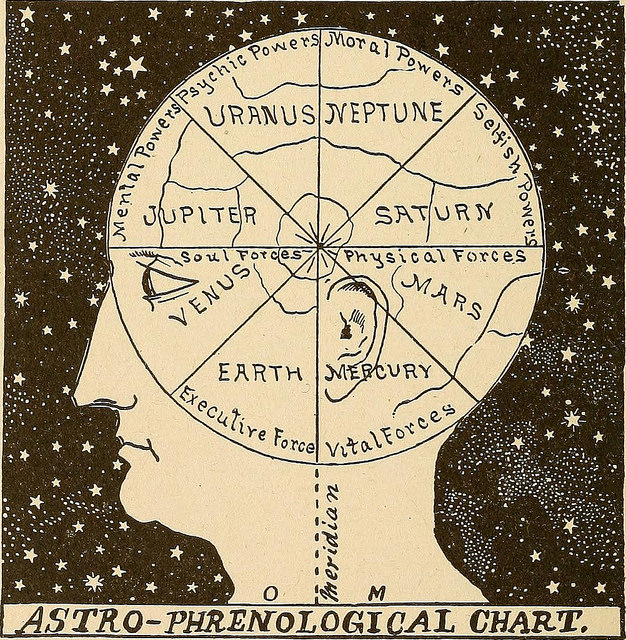
Picture taken c1919. No known copyright restrictions
The book, as I have previously noted, does give a path into the minds of our Victorian ancestors and is incredibly interesting. But it does not really answer the question, how a country such as ours, which at the time controlled much of the globe successfully, still had time to take this confectionery seriously. Possibly I am missing the point (I often do) and lack an understanding of the subject. Maybe the Governors and Generals of Empire and their immediate families were so fragile that books such as this helped them greatly, especially as the mortality rate was very high during the nineteenth century.
Although I have mentioned Empire, this little book was just as at home on the bookshelves back here in the UK. There was something in the psyche of the Victorians that produced this nature of publication. If they were not popular then they would not have been produced. Life, like Empire, was always going to be transient and I think that a large number of Victorians realised this. The good years would not last forever and there had to be more to life.
Who was God and why was such greatness thrust upon this small island? I believe that our democracy is to be admired and so did our Victorian ancestors. But, whereas my Book of Fate is just a curiosity these days, I would think that parts of it were taken quite seriously a hundred and fifty years ago. There was always a worry about what lay beneath everything and books such as mine helped, as did the Bible.
Séances were very common in Victorian times and Spiritualism was very popular in the 1840s, just to name two of the practices. Perhaps people felt uncomfortable within the high and low spheres of the time and were searching for something else just as many people turn to eastern religions. Who am I to answer this question as I am a mere writer? Perhaps as Marx noted, (loosely) books like this were the opiate of the masses, just as those dreadful celebrity magazines are today. They were certainly very popular and the volume I have was obviously mass-produced. I would imagine that one could have purchased a book such as the one I am writing about on railway stations for consumption whilst travelling. But just as I thought I understood the Book of Fate, I found a chapter that really made mincemeat of my tiny brain. I have spent hours checking it out and am still none the wiser.

By Anderiba12 (Own work) [CC BY-SA 4.0 (https://creativecommons.org/licenses/by-sa/4.0)], via Wikimedia Commons
The chapter is called Napoleon’s Book of Fate and is almost impossible to understand. There is an explanation as to its use (on a very well-worn and grubby page) but I still do not understand it. I think that reading Nietzsche or Wittgenstein would be a simpler task. But then this might be down to my own stupidity as I struggle with crosswords and the like. I know a bit about Napoleon, as we all do, but just how he managed to end up in this book is anybody’s guess. Perhaps if I ask one of my grandchildren they might further my understanding about this strange section of the book.
The book thins out towards its conclusion with references to the stars with gems such as Signs of the Four Angels or if you like, The Planets in the Houses of Heaven. I feel that I am on firmer ground as I am a typical Virgo or, so I am told. After all, most contemporary newspapers and magazines carry information on our stars. But I will close with a short quotation from this odd little book which I think gives an essence of its contents. It concerns a weed which is not much considered these days.
Yarrow
This is a weed commonly found in abundance on graves towards the close of spring and the beginning of summer.
It must be plucked exactly on the first hour of morn.
Place three sprigs in your shoe or glove saying-
Good Morning, good morning, good yarrow
And thrice good morning to three;
Tell me before this time tomorrow,
What my true love is to be.
Observe, a young man must pluck the weed off of a young maiden’s grave and a female must select that off of a bachelors grave.
Retire home to bed without speaking another word or it dissolves the spell; put the yarrow under your pillow and it will procure a sure dream on which you may depend.
This quote is almost childlike in its innocence and simplicity and it is the type of thing that you might find in a John Cowper Powys novel. But there is a certain beauty to it and many of the other passages in the book are incredibly lyrical. I am looking through a distant window into an age that I do not really understand and this is what makes the book so fascinating. One might take the contents with a pinch of salt but that, in my view, is a betrayal of a fuller understanding of what made our ancestors tick.
Who knows, you might come across another edition of my book or the like when perusing at the Arcade or elsewhere. I hope you find a copy as it is a good, if not rather strange, companion to have in your house
